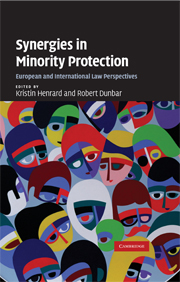Book contents
- Frontmatter
- Contents
- Foreword
- Abbreviations
- 1 Introduction
- PART A Minorities-specific instruments, provisions and institutions
- 2 The United Nations International Covenant on Civil and Political Rights: Article 27 and other provisions
- 3 The United Nations Working Group on Minorities
- 4 The OSCE High Commissioner on National Minorities
- 5 The Council of Europe's Framework Convention for the Protection of National Minorities
- 6 The Council of Europe's European Charter for Regional or Minority Languages
- PART B Non-minorities-specific instruments, provisions and institutions
- Index
- References
3 - The United Nations Working Group on Minorities
from PART A - Minorities-specific instruments, provisions and institutions
Published online by Cambridge University Press: 21 July 2009
- Frontmatter
- Contents
- Foreword
- Abbreviations
- 1 Introduction
- PART A Minorities-specific instruments, provisions and institutions
- 2 The United Nations International Covenant on Civil and Political Rights: Article 27 and other provisions
- 3 The United Nations Working Group on Minorities
- 4 The OSCE High Commissioner on National Minorities
- 5 The Council of Europe's Framework Convention for the Protection of National Minorities
- 6 The Council of Europe's European Charter for Regional or Minority Languages
- PART B Non-minorities-specific instruments, provisions and institutions
- Index
- References
Summary
Introduction
Created in 1995 under the auspices of the Sub-Commission on the Promotion and Protection of Human Rights (‘Sub-Commission’), the Working Group on Minorities (‘WGM’) has the unique global mandate of promoting and protecting the rights of minorities. Its primary normative framework is the non-binding Declaration on the Rights of Persons Belonging to National or Ethnic, Religious and Linguistic Minorities (‘Declaration’), adopted by the General Assembly in 1992. While designed to facilitate a ‘more comprehensive handling’ of the Sub-Commission's mandate in protecting minorities, the WGM appreciates that progressive interpretations of non-discrimination clauses or minority-sensitive readings of human rights provide significant minority protection.
As part of the broader UN human rights system, the WGM is cognisant of how the work of other human rights bodies, like the International Convention on the Elimination of all Forms of Racial Discrimination (ICERD) Committee, buttresses minority protection. It has urged states to make the Article 14 ICERD declaration, allowing individuals and groups to raise communications with the ICERD Committee. The Article 27 International Covenant on Civil and Political Rights (‘ICCPR’) jurisprudence is particularly relevant, as are socio-economic rights like the right to culture in the International Covenant on Economic, Social and Cultural Rights (‘ICESCR’). The WGM has urged governments to ratify these and other human rights treaties and recommended that the High Commissioner of Human Rights' (‘HCHR’) office continues to train minority representatives in how to utilise general human rights procedures; international financial institutions are encouraged to supply training on minority issues in relation to Millennium Development Goals (‘MDGs’) related programmes.
- Type
- Chapter
- Information
- Synergies in Minority ProtectionEuropean and International Law Perspectives, pp. 46 - 87Publisher: Cambridge University PressPrint publication year: 2009

